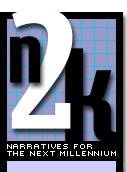

|
A Sign in Space: The Paradox of Presence and Visibility In this story, Calvino's own favorite from the Cosmicomics, the palindrome QfwfQ ("a voice, a point of view," a kind of disembodied galactic awareness) draws a playful parody of semiotics, the general theory of signs made popular and fashionable in the 1960s in Italy by U. Eco (and in France by R. Barthes and A.J. Greimas). I suggest that we may recognize in this story a leitmotiv, a recurring theme that can be followed throughout Calvino's later work: the ambivalent elation and anxiety, expressed in "Cybernetics and Ghosts" about the symbolic "death of the Author" as the original "creator" or producer of the literary work and its substitution with the combinatorial "literature machine," the new engine of the "open work" or "hypernarrative." The main rhetorical figure employed in this story by Calvino is a comic paradox: the exquisitely anthropomorphic act of painting/writing (a sign), the primordial creative gesture of human culture, is projected back to the remote beginnings of the solar system in our galaxy, the Milky Way, and turned into a kind of cosmic event, rich of unpredictable consequences. First comes a (the) sign: Qfwfq's pure intention to draw something, to leave a mark, precedes any desire to communicate any meaning, yet quickly triggers Kgwgk's (the antagonist's) reaction: like two graffiti artists, they start competing with each other, each trying to assert its own will or "style." But whereas QfwfQ is trying to produce a sign, the equivalent of a signature in space, something clearly recognizable in time as its own exact mark, Kgwgk's reaction is simply that of erasing or defacing QfwfQ's sign. Annoyed, QfwfQ decides to adopt a different strategy: counterfeiting its sign, producing fake signs or fake copies of its original mark in order to elude the antagonist; but even these are erased by the indefatigable Kgwgk. The paradoxical nature of their competition (reading and writing each other out) gets even more complicated: QfwfQ notices that Kgwgk's erasures begin to fade out, as their reciprocal constellations pass by the place where they left their marks (or counter-marks), with each galactic revolution. QfwfQ thus impatiently awaits for its first sign to return "to its pristine visibility" ("The Galaxy turned like an omelet in its heated pan, itself both frying pan and golden egg; and I was frying in it with my impatience"). Yet, at this turning point in the story, something new suddenly emerges: where the original sign should have reappeared, other signs instead begin inexplicably to multiply, this phenomenon itself a sign that QfwfQ and Kgwgk are not alone any more in the Galaxy (have they ever been?). As signs grow thicker in space, and become ever more confused, it becomes clear that everything hides a sign, everything is a sign and being is nothing but mere meaningless self-referential "presence" ("gradually living among signs has led us to see signs in countless things that, before, were there, marking nothing but their own presence..."). Everything then explodes in a kaleidoscopic "unlimited semiosis," where all signs are (mysteriously) linked to other signs, in a universe made of writing (and reading) where everything is writing and thus must be read or else remain undeciphered: "the badly inked tail of the letter R in an evening newspaper joined to a thready imperfection in the paper, one among the eight hundred thousands flaking of a tarred wall in the Melbourne docks, the curve of a graph, a skid-mark on the asphalt, a chromosome..." Lightness, quickness, exactitude, visibility, multiplicity, all the values that Calvino will extol in his Six Memos, twenty years later, are already implicit in QfwfQ's ironic quest for a uniquely consistent "authorial" style. Yet, this story ends on a provisional note: space is so saturated by signs, written all over, that there is "no longer any way to establish a point of reference" and QfwfQ's original sign is thus irretrivably lost. Or worse: in a universe where everything is connected, an infinite net of (hidden) correspondences, "any point could be the point of departure, any sign heaped up with the others could be mine, but discovering it would have served no purpose, because it was clear that, independent of signs, space didn't exist and perhaps had never existed. Thus, the empty space that triggered QfwfQ's primordial gesture of creativity was just its inability to read what was already written there... Massimo Riva |
|